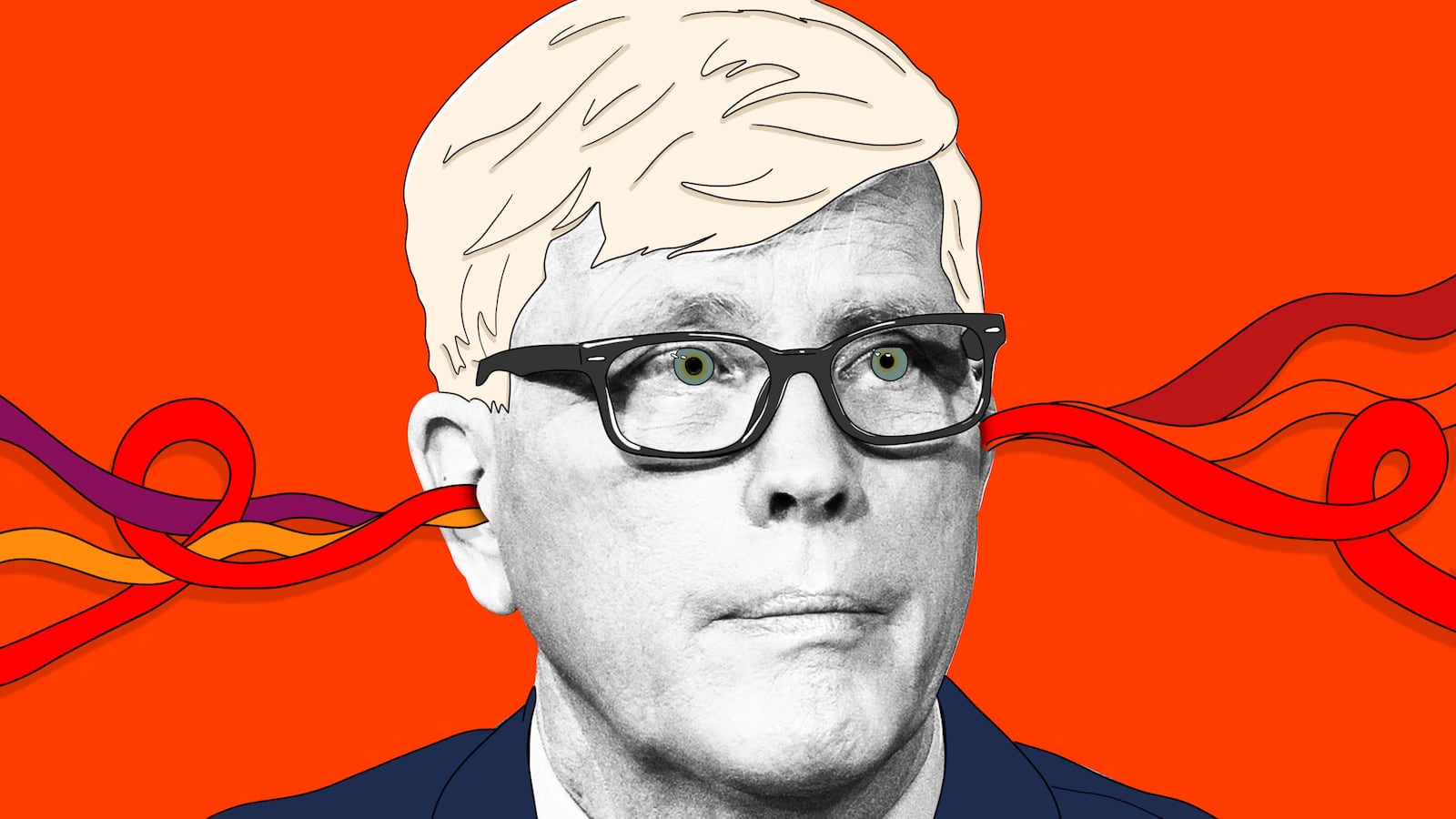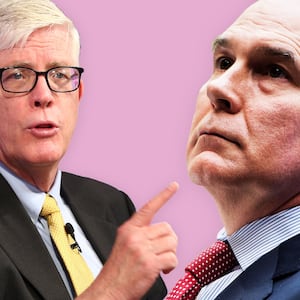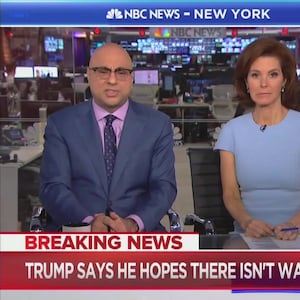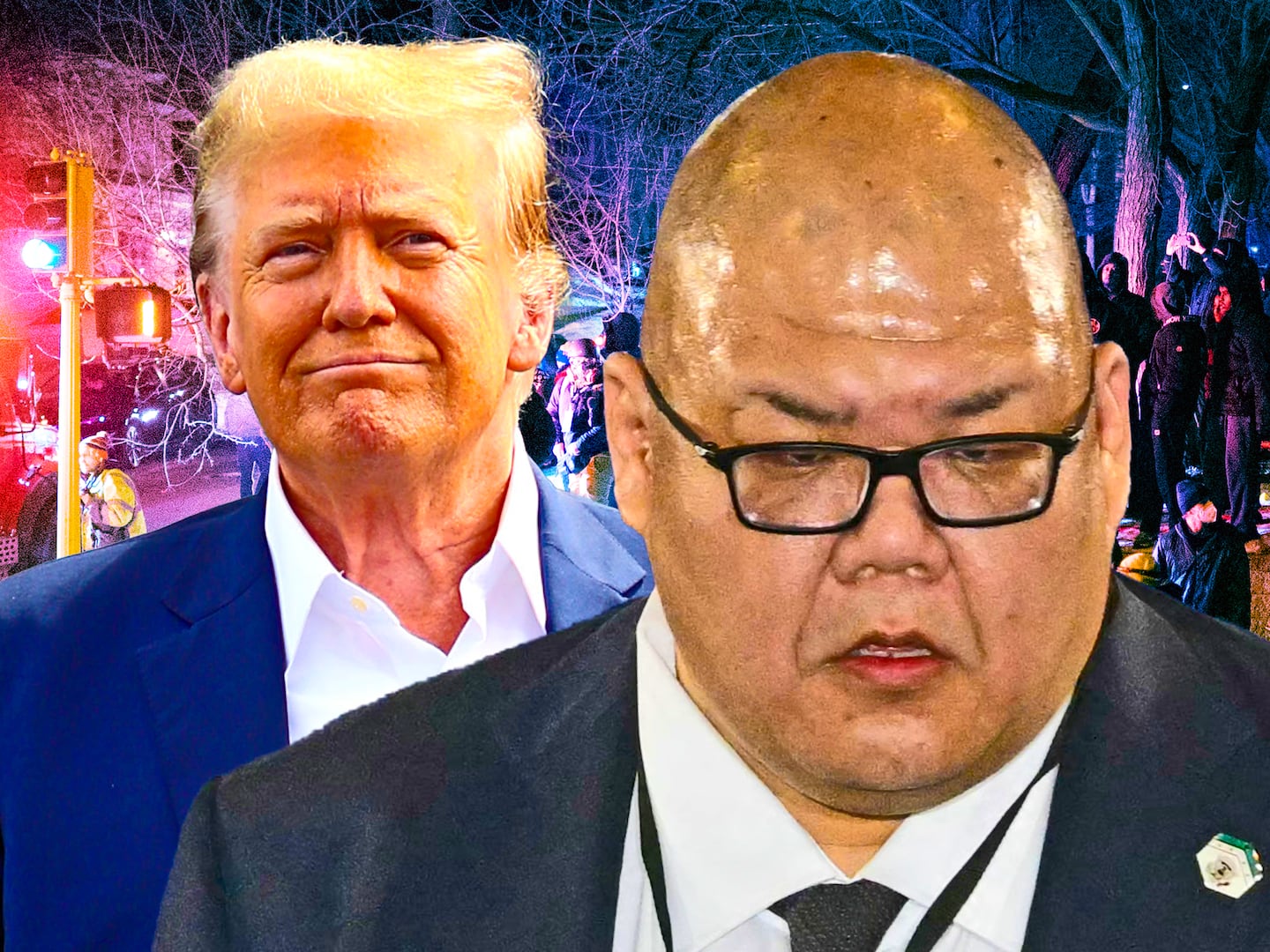When Hillary Clinton’s campaign in 2016 wanted to reach conservative voters, they decided there was only one person in right-leaning media who’d give them a fair shake: Hugh Hewitt.
According to multiple sources, the Clinton campaign considered playing ball with Hewitt’s radio program because advisers viewed him to be an even-keeled, serious-minded conservative pundit who could have a civilized, intellectual, and issues-focused discussion with the former secretary of state. She eventually appeared on the show in 2017.
Nearly three years later, however, the likelihood that any top 2020 Democratic presidential candidate would even consider an appearance on Hewitt’s show is closer to zero.
Since President Donald Trump took office, it seems, Hewitt has undergone a dramatic political shift mirroring the path of the Republican Party—one that has become increasingly about fealty to the president, above all other values—leaving some of the radio host’s friends dumbfounded.
“He’s lost his fucking mind,” said one senior colleague at MSNBC, where Hewitt was once a host and is currently an on-air contributor. “He’s put himself in the same position as Lou Dobbs.”
Once an aide to Ronald Reagan and early supporter of Mitt Romney’s presidential ambitions, Hewitt has fallen in line with the rest of the conservative media ecosystem as a reliably Trumpian defender of the president’s bizarre and potentially criminal behavior—his popular radio show now fervently bashing Democrats and providing cover for Trump’s many ongoing scandals in a way that seemingly morphs Hewitt into an intellectualized version of Fox News stars like Sean Hannity or Dobbs.
He’s become one of the leading GOP media voices attempting to push a legal framework justifying Trump’s infamous July 2019 phone call in which he committed a quid pro quo by pressuring the Ukrainian president to investigate former Vice President Joe Biden and his son.
After a complaint by a whistleblower at the heart of House Democrats’ impeachment inquiry was publicly released, for example, Hewitt was dismissive—and in an unusually conspiratorial manner. “Hot take from a smart guy: ‘Just read whistleblowers complaint. Theory, this is a cover up, not just of Biden, but the whole Clintons Obama Biden collusion debacle riff with illegality. The complaint is someone in that mix trying to cover their ass,’” he tweeted.
And when a memo of Trump’s call with Ukraine was released, Hewitt was equally unimpressed, writing a Washington Post column labeling the phone chat a “nothingburger” à la “Al Capone’s vault.” He also excused and applauded Trump’s behavior exhibited on the call.
“True, a more circumspect president might have steered clear, in the call with Zelensky, of discussing Ukraine’s history of corruption,” Hewitt wrote. “And another president might have considered it bad form to bring up former vice president Joe Biden’s son, Hunter, and his involvement with a Ukrainian energy company. But Trump isn’t circumspect. If something is on his mind, that’s what he says, and he speaks directly, not with diplomatic evasions.”
Far from his days as a cool-headed MSNBC daytime host, Hewitt has recently begun to align himself with some of the more fringe characters in the right-wing fever swamp.
He appeared on bombastic ex-Trump aide Sebastian Gorka’s radio show in late September, defending his assertion that, instead of the whistleblower’s revelations being negative for Trump, actually, “the whistleblower took a shot at Trump and instead hit the Bidens.”
And Hewitt has frequently turned over his airwaves to Kurt Schlichter, a middling right-wing blowhard who provided Trump with one of the more bonkers talking points regarding Syria—that the Kurds are undeserving of U.S. help because they did not assist the World War II D-Day landings—and has fantasized in graphic detail about killing Democrats in a modern civil war.
As such, Hewitt has begun to echo the musings of such far-right defenders of the president. On his radio show, he has called the impeachment inquiry a “lynch mob” and a “soft coup, dressed in constitutional clothing.” He uncharacteristically added: “Quote it again. You think I'm embarrassed by that? I’m not. That’s exactly what’s happening.”
And, of course, Hewitt’s public attempts to cover for the president have not gone unnoticed by Trump.
“Thank you Hugh!” the president tweeted after the radio host wrote that Americans should support the Trump administration’s attempts to get foreign leaders to probe Democratic rivals over the 2016 election. It was a far cry from the pre-election times Trump publicly bashed Hewitt as a “3rd rate” host.
The stalwart conservative legal pundit’s recent transformation has raised eyebrows among friends who long viewed him as a moderate and reasonable voice in a right-wing media increasingly dominated by pandering to the lowest common denominator.
Conservative radio host and prominent Trump critic Charlie Sykes told The Daily Beast that while his shift reflects the GOP’s overall descent into Trumpism, it is still striking to see Hewitt—who is regularly featured on Beltway talk shows like Meet the Press, where he’ll appear this Sunday—give into such instincts.
“What's really surprising isn't just that Hewitt has become a reflexive Trump defender, it is his willingness to torch his reputation by indulging in such rank hackery,” Sykes said. “I mean, it's just embarrassing stuff.”
Hewitt had long been positioned by Beltway political journalists as a genial and calmer alternative to the more stereotypically incendiary right-wing talk radio personalities.
USA Today described him in 2015 as “the radio voice of the establishment GOP aired without rancor,” saying Hewitt was a principled conservative who still refused to “play to the base.” The Guardian went further in a profile that same year, calling him “the thinking candidate’s Rush Limbaugh,” while the Washington Post said his “reputation for facilitating rich and respectful on-air conversations with guests whose own political loyalties lie far afield from his own” made it so “Hewitt haters like Trump can be hard to find.”
Hewitt himself used to play into the media framing of him as a compassionate conservative. In the past, he’s described his own show as akin to an NPR for conservatives. And like many other mainstream Republicans, during the 2016 campaign, Hewitt expressed many reservations about the former reality television star: He railed against the nominee over the Access Hollywood tape in which Trump bragged about nonconsensually groping women; and, at one point, the conservative radio host was applauded for exposing Trump’s lack of knowledge in basic elements of foreign policy, drawing the future president’s signature ire.
“Very low ratings radio host Hugh Hewitt asked me about Suleiman, Abu Bake al-Baghdad, Hassan Nasrallah and more - typical ‘gotcha’ questions,” the future president whined on Twitter, minutes later adding: “Why would a very low ratings radio talk show host like Hugh Hewitt be doing the next debate on @CNN. He is just a 3rd rate ‘gotcha’ guy!”
Since Trump took office, Hewitt has obviously changed his tune on the president—largely citing his desire to see a more conservative Supreme Court. But such a drastic conversion has resulted in Hewitt contradicting many of his own previous positions that were of deep concern to him during the Obama administration.
During a May 2013 show, for instance, Hewitt was adamantly opposed to whistleblower intimidation, and was aghast at House Democrats who he believed tried to silence a Benghazi whistleblower. “If you can imagine the number, the principal aide to the Secretary of State berating the chief of mission, and a survivor of a terrorist attack, and demanding a report on the visit and upset that her lawyer was excluded from a meeting, it’s a clear intimidation of a whistleblower,” he said then.
Also directly contradicting his excuses for the Trump administration: Hewitt was a leading voice of concern about Obama using his office to target political opponents. On numerous occasions, the radio host lamented the allegations that Obama’s SEC targeted Romney supporters and that the IRS targeted conservative tea party activists. “The IRS got away with murder, and with targeting tea party groups,” Hewitt said at the time. “There has been no justice.”
During the IRS investigation, Hewitt even boosted a column bemoaning that Republicans simply asked questions while Democrats attacked House Oversight Committee then-Chairman Darrell Issa—a nearly mirror image of Republicans’ Trump-era attacks on Rep. Adam Schiff, a top House Democrat chairing the intelligence committee.
And despite the fact that perhaps Hewitt’s most famous moment of the 2016 cycle was his schooling of Trump on the future president’s confusion of the Kurds and Quds Force, the Orange County-based radio host now seems wholly impressed with Trump’s approach to abandoning Kurdish allies in Syria.
“Turkey can’t want a war with Kurds but if it does we can’t be killing Turks with Americans throughout Turkey, our base there,” he recently tweeted. “Some will cast any deal w/ Turkey as @realDonaldTrump getting close w/ a dictator. It’s not. It’s dealing with the realities that we can’t stay forever.”
Indeed, the fact that Hewitt now often seemingly twists himself into pretzels to defend Trump has baffled and frustrated many of his Beltway fans—including elected lawmakers. “[M]y friend Hugh (who I like) makes the case that trading foreign aid for political help is the modern equivalent of the Louisiana Purchase,” Sen. Chris Murphy (D-CT) recently remarked on Twitter. “Bold.”
Even NBC anchor Chuck Todd, one of Hewitt’s biggest friends at MSNBC, seemed confused when Hewitt said in September that Hunter Biden should have been under FBI surveillance since at least 2014.
“I don’t—Hugh, I have no—,” the anchor stammered.
“Read the column,” Hewitt replied.
“I have no idea how that is even remotely relatable,” an exasperated Todd said, adding: “But I will read your column.”







